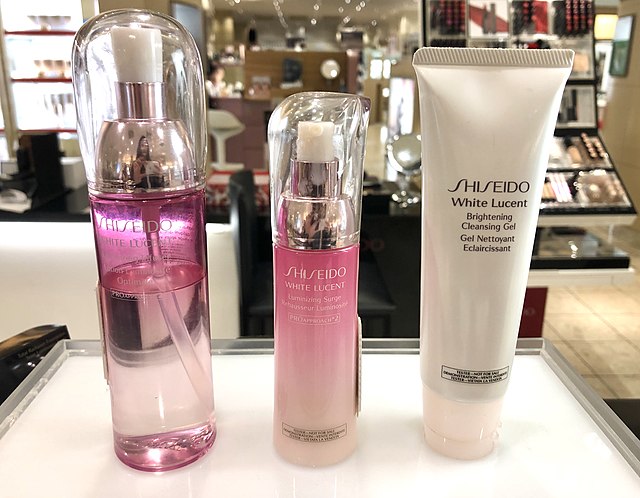Opinion | Skin bleaching products are harmful to the Black community


Skin lightening products in a store.
When I was younger, I saw my first skin whitening cream at my grandmother’s house. At the time I didn’t know what that cream was or did, but I just remember seeing my grandmother use it daily with a look of satisfaction spread across her face. She praised having and wanting a lighter skin tone, while degrading the skin tone she already had.
Recently, I remembered her using the cream and praising the product. So, I decided to rewatch videos on skin bleaching — why it’s popular, the financial expenses and the health dangers of doing this procedure. I’ve always wondered — why aren’t these products banned? Why do these products make a lot of money? What makes people use them? So, I looked deeper into the world of skin whitening that my grandmother had so much praise for.
What is skin whitening?
Skin whitening, also known as skin bleaching, is a cosmetic procedure that aims to lighten dark areas of skin or achieve a generally paler skin tone. For Black people, this industry is not only harmful to us emotionally, physically and financially, but also mentally as it perpetuates colorism by continuing the stereotype that having a dark skin tone is seen as monstrous and unattractive.
Why would someone want to change their skin tone?
In the Black community, terms like lightskin, brownskin and darkskin are used to differentiate skin tones when either describing someone or discriminating against someone. This is also known as colorism. Colorism is the prejudice or discrimination, especially within a racial or ethnic group, of favoring people with lighter skin over those with darker skin.
Colorism dates back to the beginning of American slavery, when masters would use skin tone to determine whether a Black person was fit to work in the house or on the fields. Some instances of colorism include discrimination from job offerings or the infamous Brown Paper Bag Test, which was a practice used to determine acceptability and privileges for Black people by placing it beside one’s face — if one was lighter or the same complexion as the bag, then they would be accepted, and someone darker than the bag would not.
Who uses skin bleaching products?
According to The Conversation, women of color spent $8.6 billion on skin whitening creams and products in 2020, with $2.3 billion spent in the United States alone. Skin whitening is a cosmetic industry that grosses high revenue from its products, promotions and commercials. The Borgen Project explains how in Nigeria, 77% of women use and purchase skin bleaching creams. It’s also used in countries like South Korea and India.
The phenomenon of wanting a lighter skin tone is heavily prevalent in countries in Africa, Asia and the Caribbean. The Washington Post noted a 2017 survey conducted by the Jamaican government which found that out of the country’s population of 2.8 million, 300,000 people bleach their skin. A Jamaica Health and Lifestyle Survey from 2018 found that 12.5% of Jamaican men use skin whitening products, compared to 8.8% of women.
As a Jamaican-American, I have been in contact with this industry and these products from a young age. Although I never used or touched any whitening products, the obsession with skin bleaching and wanting a lighter skin tone has been praised by the Jamaican side of my family. I love my Jamaican heritage, and I learned to love my skin tone later in my life, but it’s upsetting seeing others not have that same love for something they cannot control.
Where are skin bleaching products considered illegal?
Although countries like Japan, Australia and Ghana are banning and regulating skin whitening creams because of certain drugs and chemicals used, they are still largely used and widely bought across the world. The industry is projected to gross around $12.3 billion by 2027.
What are your thoughts about skin bleaching?
Melanin comes in different shades of skin tone and skin bleaching shouldn’t be the answer when dealing with colorism. These products are extremely harmful not only physically and financially, but mentally, perpetuating the notion that dark skin is not beautiful.
People equate skin tone with beauty and say that beauty is subjective, but skin tone shouldn’t be a factor when determining that.
Ashanti McLaurin primarily writes about Black culture, human injustices and gives life advice. Write to her at azm18@pitt.edu.
Recent Posts
‘He’s off to a much faster and better start’: Republicans reflect the second Trump administration’s first two months
Since Inauguration Day Trump’s second term has caused division amongst young Americans. Despite these controversies,…
Who Asked? // Why do we accept bad treatment from people?
This installment of Who Asked? by staff writer Brynn Murawski attempts to untangle the complicated…
What, Like It’s Hard? // Lean on your people
Contributing editor Livia LaMarca talks about leaning on your support networks and gives advice on…
Note to Self // Hot Girl Summer
In the sixth edition of Note to Self, Morgan Arlia talks about how she is…
A Good Hill to Die On // Down to Date and Time
In the latest version of “A Good Hill to Die On,” staff writer Sierra O’Neil…
‘Dress for Success: Closet to Career’ alleviates the stress of building a professional wardrobe
As the end of the spring semester rapidly approaches, many Pitt students find themselves in…

